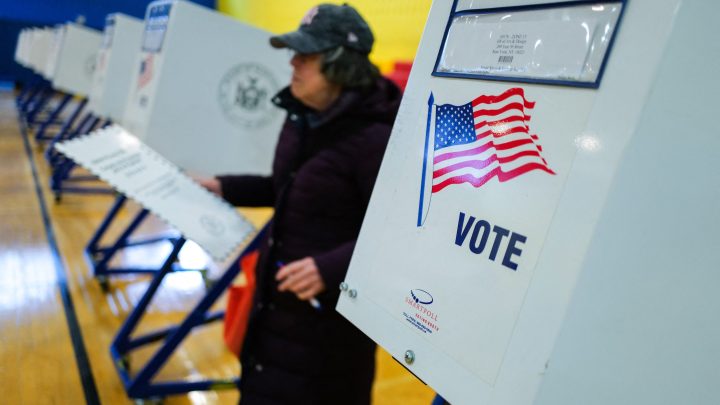
It’s getting harder to predict the economy’s effect on presidential elections
It’s getting harder to predict the economy’s effect on presidential elections

While working on presidential aspirant Bill Clinton’s 1992 campaign, strategist James Carville famously coined the phrase, “It’s the economy, stupid.”
That sentiment is the reason political strategists agonize over every economic data release in the run-up to the election and why campaigns spend millions trying to shape people’s perceptions of the economy.
But some experts argue that the connection between how the economy is doing and how people choose to vote is less clear than it used to be.
There are basically two ways to try to predict the outcome of an election before a vote is cast.
“One is using the polls. … That’s the most popular one that’s in the media all the time,” said Michael Lewis-Beck, who teaches political science at the University of Iowa. “The other one is models, which are statistical models, basically regression equations, which heavily emphasize the economy. And those are sometimes called political economy models because they may add in some political variables as well.”
Over his career, Lewis-Beck has written hundreds of books and articles on election forecasting and, with colleagues, developed a forecasting model that’s been right 15 of the last 18 presidential elections.
The model uses a mix of data, including how fast the economy is growing and how popular the incumbent president is, to help predict how the election will go.
There are plenty of other ways to build models, most of which include some kind of polling data. But just like it’s been getting harder for polls to accurately capture public opinion, many experts say forecasting has been getting harder as well, although for different reasons.
“Prior to the age of polarization, if you map out the incumbent party’s vote share with performance indicators of the economy, you get a very reliable forecast model,” said Rachel Bitecofer, a political scientist and Democratic strategist. “But over time … instead of, you know, growth of the economy, GDP, unemployment, things like that, being highly predictive, the main predictor became polarization.”
Bitecofer and others acknowledge decades of research showing that people’s opinions of the economy have always depended to some extent on whether their party is in power. But now, she said, people are so motivated by party in their voting decisions that the economy has diminished as a factor in their decision-making.
“The economy could be incredibly salient if there was another economic collapse, something catastrophic,” she said. “But in terms of a generally stable economy, which our economy right now is … it is not likely to have much of an impact.”
As a result, according to Alan Abramowitz, a professor emeritus of political science at Emory University, “these sorts of forecasting models that incorporate measures of economic conditions are just not working very well anymore.”
Abramowitz said another reason forecasting is harder these days is that, although models can be quite good at predicting the popular vote, that’s not how presidents are elected in the United States.
“What ultimately matters, of course, is the electoral vote,” Abramowitz said, referring to the Electoral College, “and the electoral vote hinges on the outcomes in a handful of closely contested states. Well, that’s very difficult to predict.”
For the first time in his decadeslong career, Abramowitz said he won’t even bother trying to put together a forecasting model this year.
“I know that enterprise continues, people will continue to do this,” he said. “I am so skeptical about the value of this particular enterprise right now … I’d rather leave it to others to try to figure out how to do this. And I think a lot of us who’ve been in this game for a long time probably feel about the same way.”
Others in the field still have hope for predictive models, including Michael Lewis-Beck at the University of Iowa. He said you can adjust the models to account for increasing polarization. Additionally, Lewis-Beck argues, it’s far too early in the cycle for most Americans to start directly tying the economy to their presidential vote.
“I’ve been doing this for a long time, and every time … there’s always someone who says the economy won’t matter,” he said. “But at the end of the day, the elections in this millennium, the economy has mattered in every single one.”
He predicts that will be the case in this election as well.
There’s a lot happening in the world. Through it all, Marketplace is here for you.
You rely on Marketplace to break down the world’s events and tell you how it affects you in a fact-based, approachable way. We rely on your financial support to keep making that possible.
Your donation today powers the independent journalism that you rely on. For just $5/month, you can help sustain Marketplace so we can keep reporting on the things that matter to you.

















